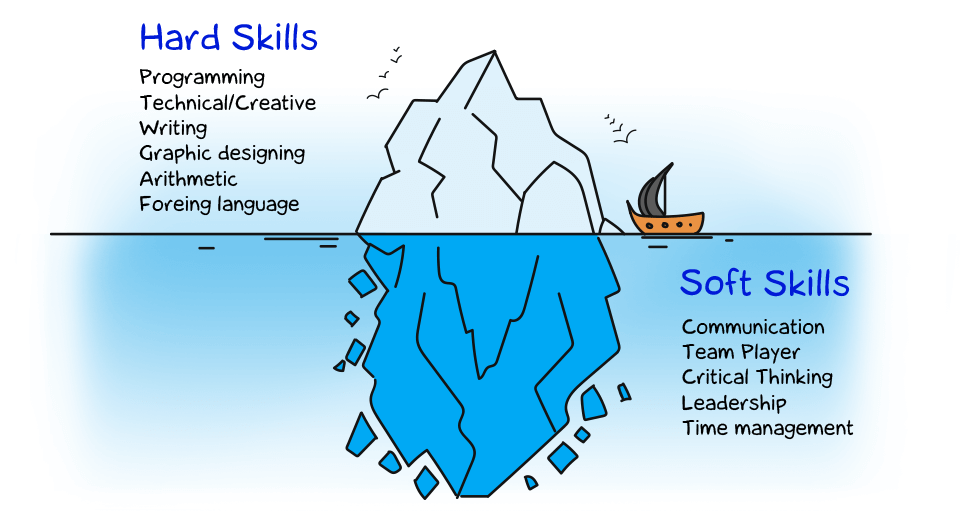Employment
Theory: Developing Soft Skills

It has long been customary to divide employee skills into two large groups:
- Hard skills are technical skills that are directly related to work tasks. For example, a developer's hard skills include programming languages and knowledge of frameworks.
- Soft skills are more abstract personal qualities that indirectly help you deal with your responsibilities. For example, a developer's soft skills are the ability to communicate with their team, manage their time, be empathic, and give constructive feedback.
According to Linkedin Research on Global Talent Trends, 92% of human resources and hiring managers evaluate candidates not only on hard skills, but also on soft skills. It may seem that soft skills aren't as important: if a programmer writes great code, then that should be enough, right? In actual fact, it's a little more complicated.
Well-developed soft skills help you:
- Communicate productively with your colleagues and avoid misunderstandings
- Build teamwork and create an atmosphere of mutual support
- Clearly divide tasks and responsibilities within the team
- Agree on deadlines and rules of interaction
- Organize processes within the team
- Negotiate with customers
If all the programmers in the team have well-developed soft skills, carrying out your assigned tasks is quicker and easier. Such teams will have learned to communicate effectively with each other, saving lots of effort and time.
A beginner may not know all the nuances of their programming language, but that's no big deal, they'll learn as they go on. But properly developed soft skills will put them way ahead of a candidate who is difficult to work with in a team. Soft skills are much harder to improve than any technical skills. There is even a joke among HR workers that employees are hired for having hard skills and fired for their lack of soft skills.
Soft skills help you not only to find a job, but also move up the career ladder faster. It's more likely that the team leader won't be the most experienced developer, but the one who behaves proactively in relation to related tasks and potential problems with the project, and will discuss these matters with their colleagues and supervisor, and suggest solutions.
What soft skills are in demand now? First of all, the skills that help you see different perspectives, build relationships with your project team, and present your results.
Yuval Noah Harari, in his “21 Lessons for the 21st Century”, says that students no longer need a body of knowledge or the ability to extract information. Much more relevant is the ability to distinguish truth from lies, and essential details from secondary details. These skills help you think, they help you form disparate and variegated information into a fairly coherent picture.
It doesn't matter as much whether a high school graduate can solve equations, conduct experiments, write computer programs, or speak Chinese. This knowledge may lose relevance because it may all be done by AI in the future. The most important skills will be the ability to adapt to change and learn new things, and the ability to maintain composure and balance in unfamiliar situations.
That's why progressive educators suggest focusing on what's called 4C:
- Collaboration
- Communication
- Critical Thinking
- Creative thinking
Let's take a closer look at these four skills and discuss how to develop them.
Collaboration
The ability to collaborate, to work in a team, is one of the most frequent requirements in job postings. A true team player can easily come into their own in any company. Such a person will come to the rescue when needed, won't get themselves down if things don't go well, will be able to admit their mistakes, and won't instigate conflict.

How do you collaborate successfully? To begin with, it's important to clearly understand your range of duties and your area of responsibilities, and fulfill your obligations, without letting your colleagues down. You also have to learn to accept criticism and enjoy working together.
Communication and negotiation
A newcomer to IT will be able to make a good impression on HR staff if they're comfortable communicating with them. Skills such as expressing your thoughts, asking questions, and being polite and friendly are important here.
How do you develop this skill? Communicate wherever you can, with your neighbors in the elevator or in the line at the store. Join a public speaking club or sign up for a negotiation course.
What's also important is the ability to find common ground and agree on things; disagreements are inevitable in any project. Learning to negotiate in such a way is a prerequisite for any successful career, not just in IT. To become a better negotiator, don't shy away from difficult conversations, bring up difficult topics, prepare various arguments, analyze the behavior of others in similar situations, and adopt the best practices.
Imagine you are faced with a difficult opponent when negotiating. In these situations, you need to create an atmosphere of goodwill. Is it possible to concede something of little value for this purpose?
Most people would answer, “yes,” but it's not a good decision. After all, if this concession isn't especially valuable to you, that means you're too focused on yourself. You shouldn't give in without getting something in return. For more details, check out Gavin Kennedy's book, "Everything is Negotiable". How to Get the Best Deal Every Time.
Critical Thinking
Critical thinking helps you work with the vast flow of information, look for connections between facts, make informed decisions, and take responsibility. To think critically, get into the habit of fact-checking, learning to distinguish reliable from unreliable information, and looking for links to primary sources.
The enemies of critical thinking are the unwillingness to admit one's mistakes and learn new things, conformism, conservatism, traps of perception, and stereotypes.
It's important not only to filter external information, but also to think critically about your own thoughts: to develop awareness, to question your conclusions, and test how strong your motivations are. Do the Five Why's exercise regularly. It helps to clarify the situation and critically evaluate your reasoning. For example:
- I'm reading a book on programming. Why? Because I'm interested in this author's opinion.
- Why am I interested in this author's opinion? Because the author is considered an expert in programming in Java, and I want to learn this language.
- Why do I need to learn Java? I want to make more money, and Java programming is in demand right now.
- Why should I make a lot of money? I want to travel a lot.
- Why do I have to travel a lot? It makes me feel free and I can experience lots of new things.
This example shows that you can get to the bottom of this technique and understand your values. Try asking yourself the question, “Why am I doing this?” every day before you embark on any tasks. So you can find out your hidden motivation and get rid of unnecessary tasks.
Creative thinking
Creative thinking doesn't seem to be the most obvious skill. Nevertheless, the IT sphere needs people who can think outside the box and find unusual solutions. Programmers are often faced with tasks in which requirements can change as they go along. Creativity in these situations can save your project. Flexibility, variability, curiosity, generating ideas, and resourcefulness are the main helpers of creative thinking.

How do I develop it? Expand your horizons and bring something unusual into your work routine. For example, ask yourself these questions:
- Can I perform a familiar task in a different way?
- How do I change the way I work to create something new?
To practice, let's do the Numerical Axis Method exercise. What does it consist of? You need to select an object of analysis, take any of its parameters and start changing the value of the parameter, tracking the consequences. This sounds abstract, so let's go straight to practice.
Let's take a birthday party as an example and try to change the parameters:
- Party location: What would a party look like in a small room? What would change if the area changed to an entire city or continent?
- Party time: What would a birthday that is celebrated for a full 365 days look like? And how do you have a party that lasts a couple of minutes?
Conclusions
The full list of soft skills can be quite long: it includes self-organization, planning, goal setting, time management, leadership and public speaking skills, conflict resolution and negotiation skills, customer focus, and decision-making skills.
In this lesson, we found out why we need soft skills in IT and other areas. With your soft skills, you'll be able to communicate comfortably in a team, grow your career, and achieve results in negotiations.
We also looked at the “4C”, an abbreviation that covers communication, collaboration, critical thinking and creativity. We hope that you'll choose one of these skills, begin to actively develop it, and eventually take a step toward becoming a better version of yourself.
Recommended programs
Completed
0 / 5

